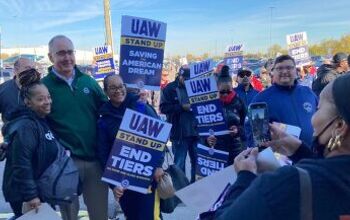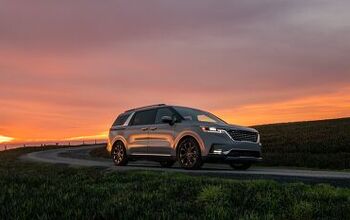California is Thinking of Changing Its Zero-Emission Vehicle Rules, and Automakers Aren't Happy About It

Halfway through its mandate to have 15.4 percent of the state’s vehicles generate zero emissions by 2025, the California Air Resources Board (CARB) is now considering changing its requirements.
The problem is too many credits handed out to green car manufacturers, who then sell them to dirtier automakers to bolster their standing with CARB, Bloomberg reports.
Since California created the mandate, makers of electric vehicles, Tesla especially, have skewed the equation. Under CARB requirements, automakers must build a certain amount of non-polluting vehicles in proportion to their market share. If they can’t, they can buy credits from another manufacturer that produces more non-polluting than required.
An all-electric automaker like Tesla has a big cache of credits ready for the taking. As a result, conventional automakers can get by with just six percent of their fleet carrying a “green” label.
Automakers are already annoyed with the U.S. government’s 2025 fuel economy target s, which are about to undergo a midterm review, but they’re really annoyed with California, especially if the state’s emissions regulator changes course in mid-stream.
CARB chairman Mary Nichols said she hasn’t figured out what to do about the overabundance of credits. Still, a chorus of voices is growing, calling on the regulator to make the mandate stricter — either by putting a cap on the number of credits available or boosting the required percentage of green vehicles.
Robert Bienenfeld, Honda’s assistant vice president for U.S. environmental strategy, told Bloomberg, “It’s bizarre to say we need to make the regulation more stringent because it’s working.”
Tesla’s vice-president for business development, Diarmuid O’Connell, called the possibility of capping credits “an extremely stupid idea.”
“You’d be punishing people who are doing the most to put EVs on the road,” he stated.
[Image: JT/ Flickr]

More by Steph Willems
Latest Car Reviews
Read moreLatest Product Reviews
Read moreRecent Comments
- SCE to AUX With these items under the pros:[list][*]It's quick, though it seems to take the powertrain a second to get sorted when you go from cruising to tromping on it.[/*][*]The powertrain transitions are mostly smooth, though occasionally harsh.[/*][/list]I'd much rather go electric or pure ICE I hate herky-jerky hybrid drivetrains.The list of cons is pretty damning for a new vehicle. Who is buying these things?
- Jrhurren Nissan is in a sad state of affairs. Even the Z mentioned, nice though it is, will get passed over 3 times by better vehicles in the category. And that’s pretty much the story of Nissan right now. Zero of their vehicles are competitive in the segment. The only people I know who drive them are company cars that were “take it or leave it”.
- Jrhurren I rented a RAV for a 12 day vacation with lots of driving. I walked away from the experience pretty unimpressed. Count me in with Team Honda. Never had a bad one yet
- ToolGuy I don't deserve a vehicle like this.
- SCE to AUX I see a new Murano to replace the low-volume Murano, and a new trim level for the Rogue. Yawn.

































Comments
Join the conversation
the core problem is that CARB supports H2, and the Chevy Bolt, Nissan LEAF 2, and Tesla 3 all destroy the economics of H2. CARB view was of 100 city mile EVs and 300 mile H2 fuel cells. but thats out of date versus Chevy Bolt, Nissan LEAF 2, and Tesla 3 which will all get 300 CITY miles. because 3 manufactures will sell credits, the price will plummet, and become so cheap, that only the bold and rich will try to sell H2 vehicles vs 200mile EVS at $150/kWh. so less H2 vehicles means death for H2 stations, which means death for H2 vehicles
What this does is illustrate the FOLLY of expensive re-engineering, re-tooling of an entire industry to meet, not a changing economic circumstance but POLITICAL mandates - based on nothing but the whim of the hour, and as easily retracted or even reversed.